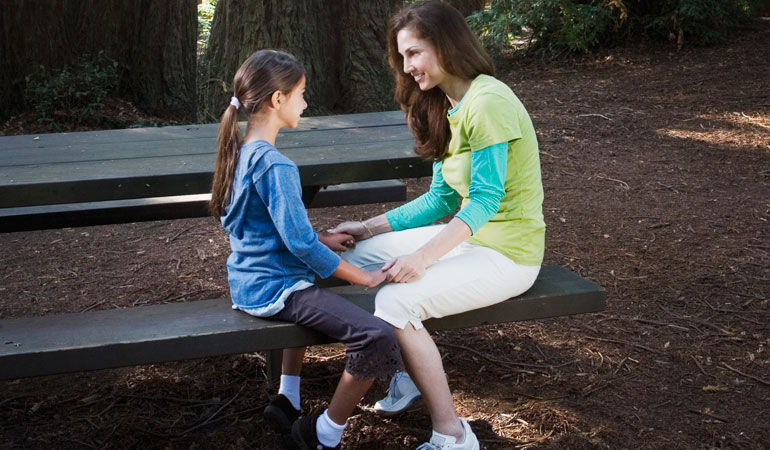Children in single-parent homes naturally wonder about their dads, and children who were adopted are no exception. The uncertainties of the “missing parent” are an additional snag for an adoptee who’s just beginning to explore her origins.
Brief answers to the “daddy question” are effective and appropriate when a child is young and needs concrete facts she can easily grasp. But when children start school, the short-and-simple routines and reassurances don’t suit their growing need to understand the world they live in. So how can you and your child deal with the realities of a single-parent family?
Talking Guidelines
Lay the groundwork. Children from single-parent homes need to know that, like all children, they were born from a “birth” mother and a “birth” father. (This becomes important later on, when your child starts to understand reproduction.) You should also explain to your child that every child has a birth father she may or may not know; but a dad is the person who helps raise a child. Making these distinctions early on reassures your child that she, and your family, are “normal.”
Then, turn the discussion to your family. You might start with, “Every baby has two birth parents, but we have just a mommy in our family” or “I’m not married, so we don’t have a dad in our family.” If you know something about the birth parents, you might add, “You have birth parents, who live in ___. I adopted you and became your mommy.”
Start simply. The conversations you have with your child will vary, depending on her age. Although young children can’t understand the concepts of “family” and “adoption,” parents should talk about these topics early.
According to Jane Mattes, author of Single Mothers by Choice (Three Rivers Press), kids are fairly concrete thinkers between the ages of two and four. During this stage, parents should handle the daddy question as they would handle other questions. If your prodding preschooler asks, “Do I have a daddy?” you could respond, “Our family has a mommy. It doesn’t have a daddy.”
Use positive words and tone. Frame your answers in a positive, inclusive way. For instance, say, “We don’t have a dad,” rather than “You don’t have a dad.” Similarly, avoid answers that confuse dads and birth fathers; don’t say something like, “You have a dad who lives in China.”
Parents should always be mindful of their tone of voice when discussing adoption. If you hint at new or unresolved feelings about raising a child on your own, your child will pick up on it, and feel unsettled herself. It’s OK to be worried (should I have a partner to help raise my child?), but it’s not OK to burden your daughter with your feelings. Sort through them, either with a counselor or in a parent support group — and display a positive outlook to your child.
Keep the conversation open-ended. All kids in single parent homes will have questions, even if they don’t express them. Some children only think about it from time to time; others are more preoccupied with the daddy question. Be open to different reactions, and see where the conversation goes. One mom I worked with, Lauren, says that one of her two sons used to press her to get married and “find him” a dad, but the other was more comfortable not having a dad. He didn’t want Lauren sharing her time with anyone else.
Classmates, Role Models, and Beyond
As kids mature, their questions become more complex. Ask your child to explain what she wants to know, so you can address her concern and answer the specific question she asks. For instance, a child who asks her mom where she is from wants a location, not a lesson in biology!
The early school years pose a unique challenge for children in one-parent homes. They want to be like everyone else, but comments from classmates set them apart: “You can’t have just a mommy, you need a mommy and a daddy to make a baby.” Fortunately, the discussions you’ve had will help your child develop her own strategies for confidently answering (or ignoring) the questions that come her way.
In addition to your conversations about the daddy question, children benefit from having male role models. Male friends, relatives, teachers, and coaches can all play reassuring roles in your child’s life. When my son was younger, he spent much of his time on weekends with a wonderful Big Brother we’d met through our local Jewish Community Center. Seek out and foster such relationships for your child.
The daddy question will arise many times as your daughter grows. Stay approachable, keep the dialogue open — and you’ll build a trust that can carry you both through the years.


